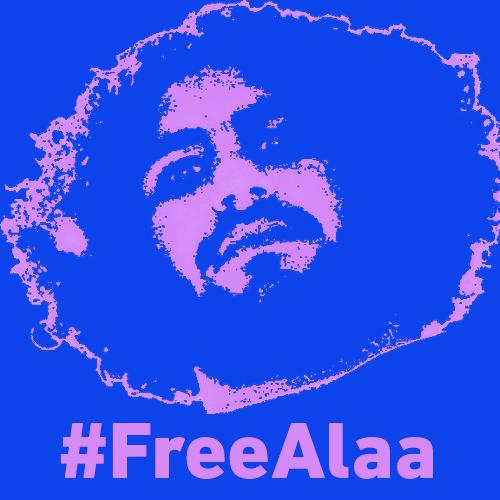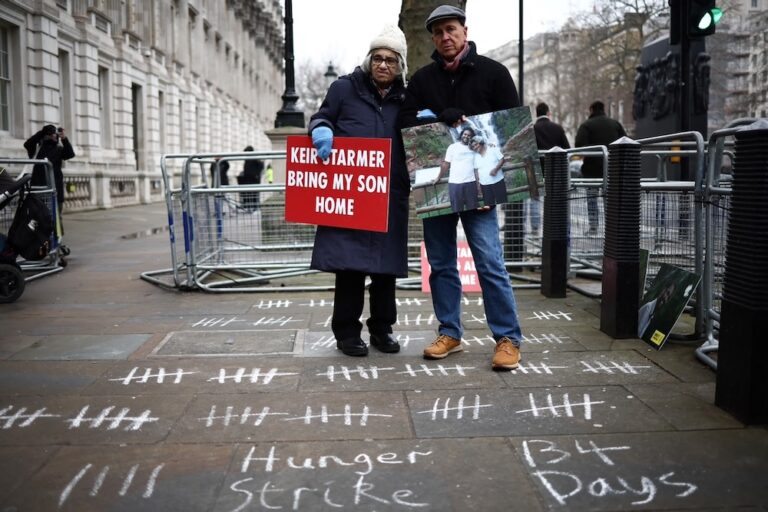Following the criminalisation of peaceful protest in Egypt in November 2013, 57 organisations and individuals release joint statement against arrests of Egyptian bloggers and political activists.
The following is a joint statement signed by 36 IFEX members calling for the immediate release and fair trial of blogger Alaa Abd El Fattah and others arrested by the recent law against peaceful protest.
IFEX members urge the release of Alaa Abd El Fattah and all those unjustly detained in Egypt
23 January 2014
The military “interim government” in Egypt is cracking down on virtually all meaningful forms of assembly, association, or opposition.
Following the passage of a November 2013 law banning peaceful protest, dozens of activists and organizers have been sent to prison. Among them is Alaa Abd El Fattah, software guru, blogger and political activist.
On the night of November 28th, security forces raided Alaa’s home, beat him and his wife when asked to see their warrant, and took and held him overnight, blindfolded and handcuffed, in an unknown location. Currently, he is held at Tora Prison, Egypt’s notorious maximum security detention center, historically used to house men suspected of violent crimes and terrorism.
But Alaa is not being prosecuted for crimes of violence. A critic of repressive state practices and a staunch advocate of free information, free and open source software, and Arabic localization in the Middle East, he was one of the first Egyptian netizens facilitating a movement for political change around a simple idea: freedom of expression.
His wildly popular blog—established with his wife, Manal—helped spark a community of bloggers in the Arab World committed to the promotion of free speech and human rights. It won the Reporters Without Borders award at the 2005 Bobs. Their groundbreaking website, Omraneya, collected blog entries across the Arab World, archiving dissent in the face of repression. As put by one popular independent media outlet: “[Omraneya is] at times the house of alternative expression and at others the amplifier of muted voices.”
Following the uprising of January 25, 2011, Alaa continued to promote free expression through online platforms. He started a nation-wide people’s initiative enabling citizen collaboration in the drafting of the Egyptian Constitution. He initiated and hosted Tweet-Nadwas (“Tweet-Symposiums”), that brought activists and bloggers from across the world into Tahrir Square, to participate in open format dialogue about tough issues ranging from Islamism to Economic Reform.
“Without looking down at our feet, let’s look forward and envision the perfect state; I myself don’t want a state but I know that isn’t possible. Instead, I must focus on the steps that might lead me to build the ‘good’ state.” – Alaa Abd El Fattah (Tweet Nadwa, June 14 2011).
Alaa has been jailed or charged under every government to take power in Egypt. In 2006, when he was only 22, he was jailed by the Mubarak government. The Supreme Council of the Armed Forces (SCAF) jailed him in 2011. Morsi brought a case against him in 2013. And he is now imprisoned by the current military government. He is not alone in this cycle of persecution. Alongside him now in prison are activists Ahmed Maher, Mohamed Adel, and Ahmed Douma—all of whom were also targeted by Egypt’s recent regimes. Thousands of other young people are in prison or unaccounted for.
Alaa’s mother, Laila Soueif, one of the founders of the Kefaya protest movement, which is widely credited as one of the key precursors to the January 2011 uprising, commented:
“Alaa is one of the most outspoken and uncompromising critics of state violence and repression of his generation. At this particular juncture, those in power are trying to sell the myth that the whole country is united behind them against the Muslim Brotherhood and their allies. The fact that Alaa, who was very vocal in his criticism of the Brotherhood while Morsi was president, is condemning – even more strongly – the current criminal behaviour of the police and the army explodes their myth. Particularly as he is not alone in taking this position. Arresting him and demonizing him in the media is a message to critics of the regime to shut up.”
The current government has already handed Alaa (together with his sister Mona Seif) a one year suspended sentence in a similar, but separate, trial. Current charges may find Alaa facing additional years. Ahmed Seif, prominent human rights lawyer and father of Alaa Abd El Fattah says:
“The Prosecution has done everything in its power to impede Alaa’s appeal against his imprisonment on remand. It has been more than a month since the Prosecution completed its investigations and referred the case to the Criminal Court, but lawyers have still not been allowed access to the case file, and neither a district nor a date have been set for the trial.”
As the third anniversary of the January 25 revolution draws near, we express our concern that Alaa’s case marks a worrying trend for civil liberties in Egypt.
The undersigned demand the immediate release and a fair trial for all those unjustly detained in accordance with the Universal Declaration of Human Rights and the International Covenant on Civil and Political Rights, to which Egypt is a state party.
Signed,
Rasha A. Abdulla, Ph.D., The American University in Cairo
Amir Ahmad Nasr, author of My Isl@m
7iber
Access
Arab Digital Expression Foundation
Association for Progressive Communication
Committee for U.S. Accountability in MENA*
Digital Rights Foundation, Pakistan
Freedom of the Press Foundation
Global Voices Advocacy
The Heinrich Boell Foundation*
Hivos*
International Federation of Journalists Asia-Pacific
Internet Sans Frontières (Internet Without Borders)
Jadaliyya
Mada Masr
Mosireen
National Lawyers Guild, MENA Committee*
PEN International – Catalan Centre*
Social Media Exchange (SMEX)
The Workshops (Egypt)
*Signed after initial release



